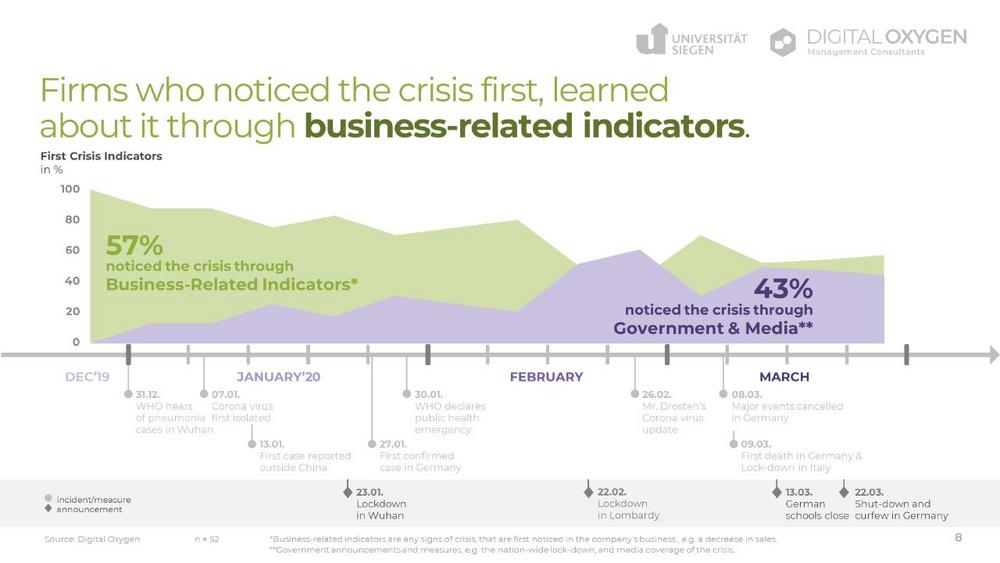Nicolas Bell, Partner at Digital Oxygen, summarizes his take-away: “We were really fascinated by the openness of our study participants and their eagerness to share their experiences during these times. The German entrepreneurial spirit and can-do attitude to solve problems was particularly noteworthy.”
Plenty of Warning Signs – Plenty of Panic?
From January onwards, the world’s news was dominated by headline-grabbing outbreaks, from WHO recommendations to disease updates and city lockdowns. Over 50% of interviewees realized that their own business would be affected in March only, despite plenty of warning signs since January. Even though a minority of companies experienced changes in their daily business as early as January, on average, it took companies until end of February to recognize and acknowledge the severity of the crisis when Italy locked down most of Lombardy. This delayed awareness can be explained by companies’ varying characteristics: On average, companies with multinational business relations, a strong focus on manufacturing, and above average annual revenue noticed the severity of this pandemic two weeks earlier than their competitors.
Putting Sales and Supply Chains on Ice
Participants revealed a sudden drop in demand and difficulties in maintaining a constant stream of supply to be the most prominent crisis indicators. 30% of participants stated that the Corona Crisis had a direct impact on their sales activities, with 28% noticing a decrease in sales, cancelled appointments, delayed decisions, and delayed payments. In contrast, 2% were struck by an increase in demand when panic buying from consumers set in in early March. Another 20% of participants experienced a disruption in their supply chains, including shortages of specific products, complete supply stops of product groups, or a Coronavirus-related production conversion at their suppliers.
Pulling the Plug on Traditional Working Structures
One fifth of participants stated the nationwide lockdown and its imposed safety measures to be one of the first crisis indicators for their business. Additional 8% were affected by industry-specific measures targeting their company with prohibitions or the closure of government institutions, which were crucial for business continuity. While it is true that official orders had a significant impact on company dynamics, daily activities, and internal communication, the government-imposed indicators only account for 29% of all changes influenced by Covid-19. The study recognizes that Germany’s government actions are by no means the sole origin of economic damages experienced by businesses, but that the situation is more complex and entails a variety of causes.
Passing Power to News Reports
Another key finding of this study is the important role that media coverage has played during these past months. As 14% of participants declared their personal media exposure as one of the first indicators for crisis recognition regarding their business, it can be concluded that media content in general is a prominent source for the economic uncertainty and disruptions in the business world. But in turn, if media is a significant indicator for crisis awareness, businesses should have noticed the crisis impact earlier than March. This discrepancy is explained by the fact that participants needed more than one indicator to realize the seriousness of the crisis, with 80% of interviewees stating that they based their decisions on more than one indicator.
The economic risks posed by the Covid-19 Crisis have affected companies regardless of size, industry, or revenue, and require manifold countermeasures. The next part of this study will take a closer look on the company-specific expectations towards their customers, their employees, and the government.
The study is available at: www.digital-oxygen.com/publications.
Digital Oxygen is an owner-operated management consultancy that focuses on the development and implementation of digital transformation and digital product strategies. Its experienced team supports leaders of the TMT industry, medical technology companies, and international start-ups on their way into a digital future. The joint success is based on a forward-thinking team and customers who see themselves as partners – who question, challenge, and are open to breaking new ground.
The Chair for Entrepreneurship and Family Business at Siegen University offers research and teaching on topics about family businesses and start-ups. The research is strongly empirically oriented and based on microeconomic and behavioral economic theories. It is published in top journals like Entrepreneurship Theory & Practice, Journal of Family Business Strategy, Journal of Technology Transfer, and Family Business Review. Moreover, the Chair conducts third-party funded research, as well as research in collaboration with different industries.
Digital Oxygen GmbH
Weißenburger Straße 25
81667 München
Telefon: +49 (89) 54044197
http://digital-oxygen.com
Telefon: 08921552184
E-Mail: info@diox.de
![]()

